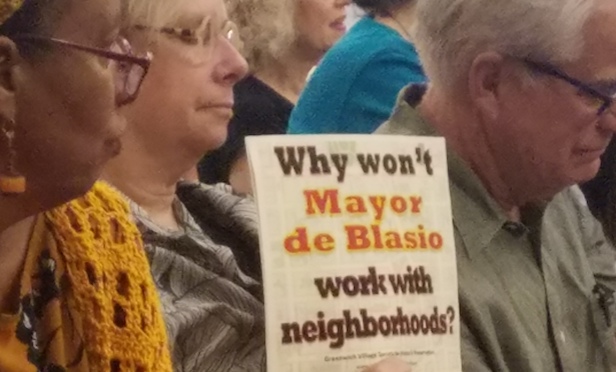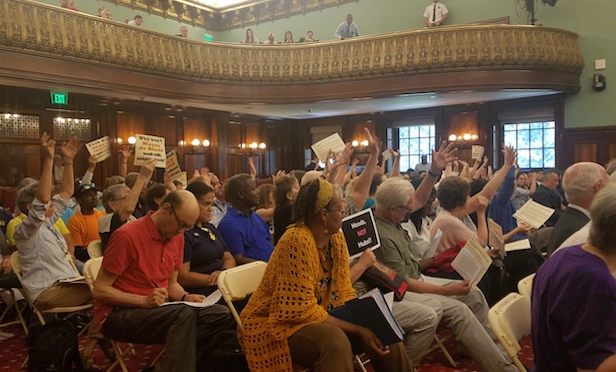 City council subcommittee, last meeting for public input before tech hub vote/ photo by Betsy Kim
City council subcommittee, last meeting for public input before tech hub vote/ photo by Betsy Kim
NEW YORK CITY—Interspersed with signs that read “Why won't Mayor de Blasio work with neighborhoods?” more than 150 people filled the seats at the City Council's subcommittee meeting last week. It was the final public hearing before the council votes on the Union Square Tech Hub in August.
From the audience reactions and hand waving, the vast majority of attendees were in support of the tech hub—contingent on some protections for the Greenwich Village and East Village neighborhoods.
The proposal requires rezoning to allow constructing a larger building. The 12-story city-owned structure at 124 E. 14th St. will be demolished to create a 21-floor office and retail tower. RAL will build the 258,000 square-foot property, paying approximately $250 million for construction costs. The city will lease the property to RAL for 99 years. The non-profit Civic Hall will rent six of the floors to run the digital training center and flexible workspaces for tech start-ups.
Following the Uniform Land Use Review Procedure (ULURP) the New York City Economic Development Corporation and involved parties gathered community input in November 2017. In February 2018, Community Board 3 had unanimously approved a resolution supporting the tech hub. It included additional rezoning to prevent neighborhood overdevelopment. The amendment added affordable housing, exclusion of hotels and big box stores, and consideration of Third and Fourth Avenue corridor rezoning, with height restrictions.
Community members point out this is not just for the neighborhood but would help preserve a historic part of the city for all of New York.
But Mayor Bill de Blasio has not agreed to the resolution with added zoning restrictions.
 City council subcommittee public hearing at City Hall addresses the tech hub./ photo by Betsy Kim
City council subcommittee public hearing at City Hall addresses the tech hub./ photo by Betsy KimAssemblymember Deborah J. Glick and State Sen. Brad Hoylman provided testimony to the subcommittee supporting the tech hub. They praised the benefits of job creation, affordable office space and increased local retail space. However they “opposed the disappointing failure to include any contextual, landmarking, or zoning protections for the surrounding communities and the existing residents or businesses.”
They pointed to “egregious and out-of-context” developments in the area, citing the Moxy Hotel, construction at 80 E. 10th Street, and the 300-foot luxury residential building replacing the former Bowlmor Lanes. Without guaranteed protections for the community in place, they urged denial of the tech hub rezoning.
Similarly, Manhattan borough president Gale Brewer supported the tech hub as permanent workforce development space, and a center to provide digital skills training to underserved communities. However, she too supported council member Carlina Rivera's calling on the administration to limit building heights along Broadway and University Place and to provide protections for properties on surrounding streets.
Manhattan Chamber of Commerce president and CEO Jessica Walker provided testimony that the site's proximity to large tech companies and multiple transportation options would benefit New Yorkers throughout the city. She said, “That is why the project must not be delayed by parochial interests or held hostage in order to negotiate other rezonings.”
Beyond the tech hub, the Real Estate Board of New York president John H. Banks has criticized “attacks on as-of-right development” from advocacy communities as a challenge to the city's growth. However, he noted that “there is a balance that needs to be struck.”
Greenwich Village Society for Historic Preservation executive director Andrew Berman testified that community members were more than willing to accept the tech hub on 14th Street, even the larger size than allowed by current zoning laws. “But not at the expense of neighborhoods. And not when it is unnecessary to do so. We have proposed reasonable zoning measures that would protect neighborhood character and encourage or require the inclusion of affordable housing,” he added.
The pressure will be on council member Carlina Rivera. She represents the area that includes the tech hub and her vote may determine the council's. At the hearing, she indicated her stance saying, “Only with a comprehensive, wholistic approach to both access to technology and protections of our vibrant neighborhood can I vote confidently for this project, and right now that vote is seriously in question.”
© Touchpoint Markets, All Rights Reserved. Request academic re-use from www.copyright.com. All other uses, submit a request to [email protected]. For more inforrmation visit Asset & Logo Licensing.







